As an association of citizens dealing with cannabis issues, we have nothing against the fact that more legal entities work in the Republic of Macedonia, but the current situation for us as activists is unacceptable. The legal entities have the privilege: the state allows them to deal with business that is still illegal for the majority of the world, the law allows the extract to be exported, and in return Macedonian citizens gain no benefit. The market has a product of only two companies that are far from being of the required quality, and the products are overpriced. In addition, the amendments to the Law on Narcotic Drugs Control, which allowed the use of cannabis for medical purposes, foresaw the use for only four conditions: HIV, Multiple Sclerosis, Epilepsy and Cancer. This is a precarious framework that does not cover all diseases where cannabis is applicable. Unfortunately as time passes, it is more obvious that this issue is not the focus for the new executive power either. Is it because of the fact that extremely big business wholesale enter the cannabis business, neglecting the needs of the citizens and patients, for which they have heartfelt support from a professed civil association?
The medical use of cannabis is only one of the aspects that the Association for Cannabis and Green Policies BILKA, Skopje deals with. In terms of the decriminalisation of cannabis in the Republic of Macedonia for recreational use, we can conclude that Macedonia is stuck in 1996 when the first Macedonian Criminal Code was adopted. Moreover, the legal provisions have been changed several times, to the prejudice of the cannabis users, and sometimes with dazzling violations of several basic Constitutional principles, as I shall elaborate below.
Namely, with the Criminal Code from 1996, the Republic of Macedonia foresees as a criminal offense the production, sale, trade, smuggling, holding on for sale, etc. of cannabis and all narcotics in general. (Unfortunately, the domicile legal provisions do not make a distinction between cannabis and other narcotics in accordance with their potential to harm the health of the person and the potential for creating additions.) This is laid out in Article 215 of the Criminal Code, for which a prison sentence was envisaged in 1996, from one to ten years, while allowing the use of narcotics is penalised under Article 216 with a sentence of imprisonment of one to five years.
In an attempt to prevent the frequent pronouncement of alternative measures - conditional convictions - by the criminal judges, the executive power in 2010 brought amendments to the Criminal Code, by which it raised the lower sentence for crimes under Article 215, to a minimum sentence of one to three years. This was done without research on whether the conservative policy produces any results, and without investigation of the consequences of such a policy (increased prison population, unnecessary criminalisation of consumers) and generally leading a severe penal policy without appropriate addressing the moment of rehabilitation.
In February 2014, Macedonian authorities approached the introduction of a new paragraph in Article 215 of the Criminal Code of the Republic of Macedonia, by introducing a privileged (lighter) form of the criminal offense, punishable under Article 215; a smaller amount, for which the new paragraph two of Article 215 foresees imprisonment of six months to three years. But this causes additional problems, because it has created a legal vacuum - neither Article 215 nor Article 122 of the Criminal Code (which clarifies the terms used in the law) explain the “small amount”, nor is it done by a by-law or regulations.
This vacuum was abused by the Republic Public Prosecutor’s Office, which in 2009 obliged all PPOs to consider a smaller amount, in particular for cannabis, up to five grams, while each quantity exceeding five grams automatically charges an “intent to sell”, even in cases where there is no evidence in that direction.
It is certainly disappointing that in the past nine years, all judges dealing with criminal law have accepted the guilty plea, as if the PPO is a legislator. This leads to an absurd and inaccurate situation where cannabis consumers are deprived of the liberty to have 6, 7, 8 or 10 grams of cannabis in their possession, acquired for personal use, and are subject to criminal prosecution alleging that the substance has been obtained for sale. This, without offering any evidence, but only keeping a mandatory guideline that is notorious for not having a legislative value.
This position of the Macedonian judicial system, which is subservient to the prosecution, is a violation of the principle of legality, because court decisions are determined based on an instruction that does not represent a source of law, which as it is known, can only be based on the Constitution, law and international conventions ratified according to the Constitution. Additionally, this illegal establishment of relations represents a striking violation of some of the fundamental values of the Constitution, which is, of course, the rule of law, respect for the generally accepted norms of international law, as well as the separation of powers of legislative, judicial and executive. Using the instructions of the Public Prosecutor’s Office (whose authority from the independence of the Republic of Macedonia in 1991 is strongly influenced by the executive power) is a direct incursion into the judiciary’s powers.
The model of decriminalisation or legalisation of cannabis in the Republic of Macedonia proposed by the Association for Cannabis and Green Policies BILKA Skopje implies a series of legal changes according to which the possession of cannabis for personal use (the quantity would be legally determined) will not be prosecuted as a criminal offence, but only as an offence. Alternatively, if the personal consumption is treated as a criminal offense, BILKA insists the envisaged punishment to be merely monetary, which would avoid criminalising cannabis consumers, and avoid unnecessary burdening of the already overcrowded prison system.
At a given moment, we cannot conclude that the political elites in Macedonia show willingness to resolve this issue, only in the part that corresponds to the big business. Alibi for this are, of course, the internationally undertaken obligations, because the Republic of Macedonia is a signatory of three large conventions on narcotic drugs: the Single Convention on Narcotic Drugs 1961, the Convention on Psychotropic Substances of 1971 and the UN Convention on Illicit Traffic in Narcotic Drugs and Psychotropic Substances 1988. It is true that all three conventions require State Parties to criminalise even the possession of cannabis, but it is also true that the conventions themselves provide a legal mechanism for abandoning or amending the Conventions with amendments. But this is a relatively long process, and the Republic of Macedonia is a small and powerless country which, when it comes to international law, mainly follows the guidelines of the larger signatory countries - thereby directly undermining, inter alia, its own sovereignty.
As activists, and myself as a lawyer, we are convinced that the decriminalisation of cannabis in the long run, in addition to the destigmatisation of cannabis users, will lead to a reduction in the use of so-called “hard drugs” which should always be a primary focus. There is a complementary question as to where we want to go as a country in regulating cannabis: do we want to have economic benefits? Personally, neither I nor my colleagues from BILKфаA have anything against the economic benefits of a possible model that proposes it, but they should always be secondary. If such a model is proposed, it must necessarily favour micro-businesses rather than big business.
This is because regulation in terms of the purity and the quality of cannabis applied for medical purposes is unnecessary for cannabis used for recreational purposes. It allows micro-enterprises, households or farmers to deal with the cultivation of cannabis for recreational purposes, which they can later distribute to consumers, whether they do it on their own or through licensed dispensers, which will contribute to the fact that these citizens will be active stakeholders in this process. This will also have an economic benefit not going into the right of the large companies to distribute cannabis for recreational use.
These economic benefits can deepen if the sale of cannabis for recreational use is not limited to domicile subjects, that is, if it is allowed to be sold to foreigners, which will undoubtedly lead to an increased number of tourists, and hence, with an increased inflow of funds, not only on the basis of the sale of cannabis and cannabis products. The main “argument” of the opponents of the decriminalisation of cannabis is that it will lead to an enormously increased number of narcotics users. The practice, fortunately, is on the side of my theory. Wherever liberal policies have been introduced, there has not been an increased, or enormous increased use of narcotics, on the contrary, its quite the opposite. Worldwide and in Europe, there are more positive examples of implementing successful liberal policies.
Portugal is the most commonly used example, but of course not unique. In the 1990s, Portugal was facing a heroin epidemic, whose prevalence in certain months reached an astonishing 2.2% on a general level. Recognising that conservative policies and constant penalising do not produce results, in 2001, Portugal decriminalised all narcotics for personal use. Precisely because of liberal policies, combined with Portugal’s shift towards a more health-centered approach to drugs, the results are more than satisfactory. The reality is that Portugal’s drug situation has improved significantly in several key areas. Most notably, HIV infections and drug-related deaths have been reduced, while dramatic increase in use has been avoided by some. (TRANSFORM drug policy foundation Drug Decriminalisation in Portugal: setting the record straight).
There has also been a decline in the percentage of people who have ever used a drug, and then continue to do so from 44% in 2001 to 30% in 2012. Drug-induced deaths have decreased steeply.
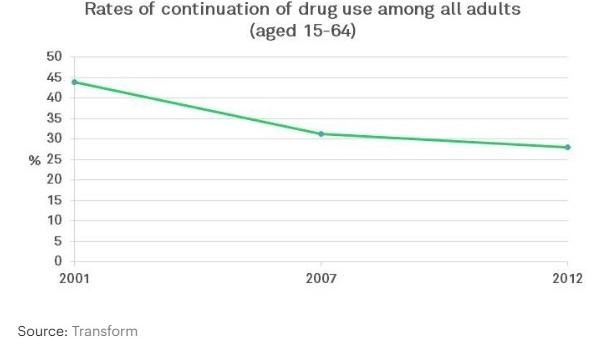
HIV infection rates among injecting drug users have reduced at a steady pace, and have become a more manageable problem in comparison with other countries with high rates.
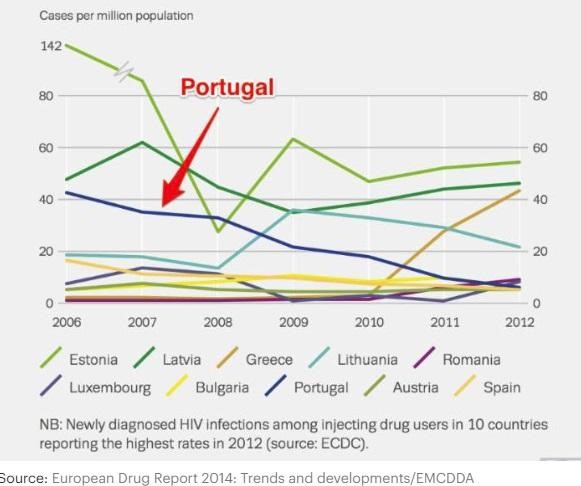
By legislative changes through the law number 40/2009, the Czech Republic decriminalised the possession of narcotics for personal use, specifically for cannabis to 15 grams in the absence of other elements of sale. The Czech Republic is an example on how to target heavier narcotics by liberalisation of punitive policies.
Although the number of cannabis users in the Czech Republic is not negligible, the national prevalence of cocaine use is only 0.3% for the general population, which is close to the European minimum of 0.2% for the last year, while among young people aged 15-24 that percentage is zero.
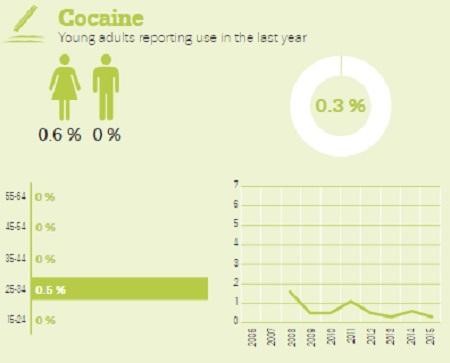
The percentage of high-risk opiate users is 1.8‰, which is below the European average and well below the maximum of 8.1‰.
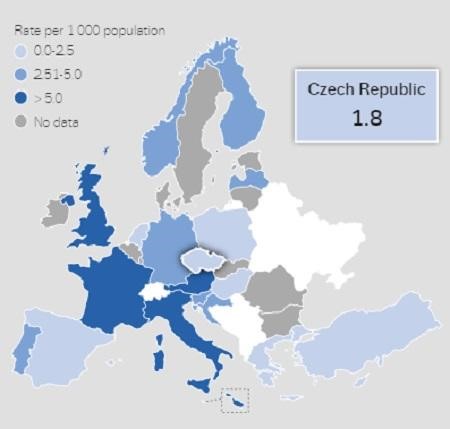
The effects of the correct liberal policies in the Czech Republic for a period of seven years are evident. In 2017, the Czech Republic is among the countries with the smallest percentage of users of hard drugs, specifically heroin and cocaine. The Czech Republic in 2017 is the country with the third lowest mortality rate caused by narcotic overdose after liberal policies have been introduced (the European Annual Reporting Center for Drugs and Drug Addiction, 2017).
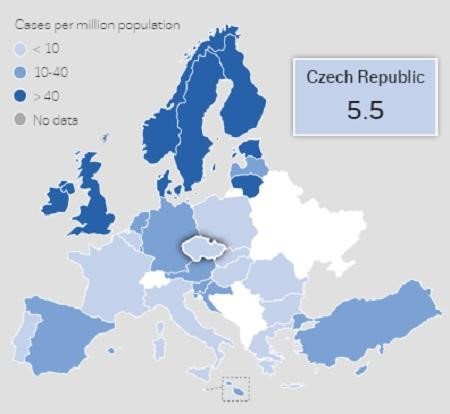
Taking into consideration the positive benefits of decriminalisation, my colleagues from the Association for Cannabis and Green Policies and I actively advocate and work on legal changes that will lead to:
– Decriminalisation of cannabis for personal use,
– Improving the legal solution for the medical use of cannabis by easing the conditions for obtaining licenses and expanding the list of conditions for which cannabis can be used,
– Providing outdoor cultivation and inclusion of Macedonian farmers in the process,
– Providing legal sale of cannabis for recreational use through authorised dispensers with compulsory involvement of micro enterprises and households. It is mandatory to legally determine that part or all of the taxable funds are used for free or subsidised use of cannabis oil for socially vulnerable categories of citizens,
– A legal framework that will allow every household to be able to grow a certain number of plants in the home.
We are convinced that this is the correct approach through which, in the medium and the long term, will lead to reduced use of hard narcotics, thereby reducing the occurrence of HIV cases as a consequence of intravenous consumption, as well as reducing the prison population. This model will also protect the business interests of the legal entities that are now working, but also of the citizens and micro-enterprises and farmers, and from the legal aspect, will lead to the rule of law. The time for decriminalisation/legalisation of cannabis in Macedonia is NOW!
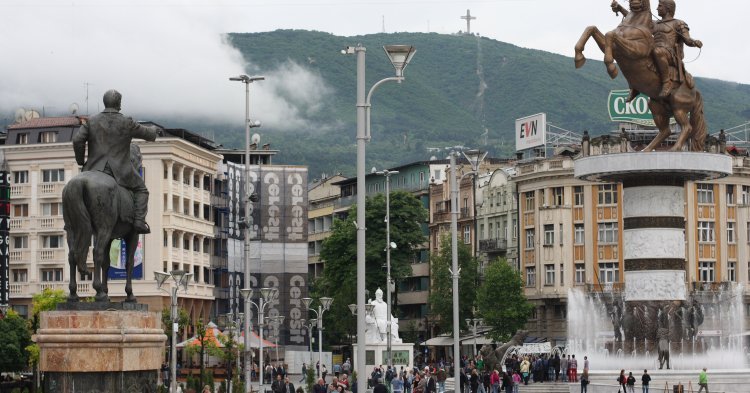
1. On 18 July 2019 at 00:18, by Aaron Replying to: Decriminalisation of cannabis in the Republic of Macedonia
Replying to: Decriminalisation of cannabis in the Republic of Macedonia
I dont understand.. Are sales of CBD products legal or are they strictly licenced and must be sold in a pharmacy by chosen companies.?
Follow the comments: |
|
